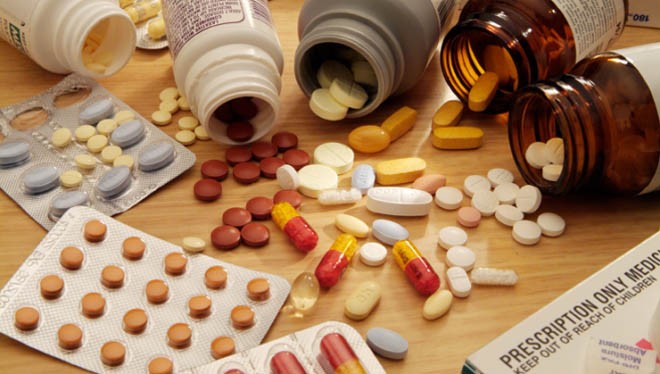
In the absence of a workable mechanism ensuring affordable prices and uninterrupted supply of medicines, patients pay high prices

Smooth supply of affordable life-saving drugs is a pipe dream, despite new regulations and agreements between the government and pharmaceutical industry.
As per the new pricing formula under Drug Pricing Policy 2015, notified on July 26, 2016, prices of scheduled drugs (life-saving medicines) have gone up by 1.43 per cent (50 per cent of Consumer Price Index), prices of non-scheduled drugs by 2 per cent (70 per cent of CPI) and lower priced drugs by 2.86 per cent (equal to CPI).
The prices would apply to 10,000 medicines available in the market. The total number of registered medicines is 70,000, however, they are not available in the market as drug companies have stopped their production under various pleas.
Various multinational and national drug companies have termed the new pricing benchmark irrational, and demanded further increase -- to help the pharmaceutical industry survive. Many struggling companies have waged legal battles against the government and have been using court stay orders to sustain themselves, especially since 2015.
"The government has stagnated the prices of medicine since 2001. But the companies have continued to overcharge under different pretexts," says an official of the Ministry of National Health Services, Regulations and Coordination.
In the absence of a workable mechanism ensuring affordable prices and uninterrupted supply, patients pay high prices and risk their lives. The only ones that are benefiting in the situation are black marketeers, cartels, pharmaceutical companies, doctors, hoarders, middlemen and departmental bureaucracy. This sorry situation has pertained in the last two decades.
"Stockists are complicit in creating an artificial shortage of essential medicines, helping the black market to thrive," says Muhammad Murad, pharmacist. "Essential drugs treating pregnancy, TB, cancer and heart diseases disappear from the market, and a patient’s family, if lucky, is able to acquire them at three times the actual price."
Pakistan has miserably failed to implement the WHO essential medicine model list, which was first prepared in 1975 and revised as the 19th edition in September 2015. Even the list prepared by Pakistan in 1987, and later revised in 2000 remains unimplemented.
The list includes: folic acid tablets, 0.4 mg which is highly imperative for brain cell complication of newborns; ascorbic acid, 50 mg, that help immune system, joint pain, depression and wound healing; Vitamin B12 hydroxocobalamin, 1mg injection, for the creation of healthy DNA (human body generic material) are hardly available. But, even if found in the market, the quality is usually compromised.
Other medicines such as antibacterials, Penicillin V, used for treating common infections are also scarce in the market. Furadantin used to cure urinary tract infections, which cost Rs2 per tablet is available only in the black market at Rs70 to Rs110. Anti-staphylococcal Penicillins (cloxacillin and flucloxacillin) are extremely expensive antibiotics.
Health issues rank low on the government’s priority list. Drug Regulatory Authority of Pakistan, established under the DRAP Act 2012 for setting drugs’ pricing, coordination and enforcement of the Drugs Act 1976, has operated on an ad hoc basis since the last two years.
Dr Muhammad Aslam Afghani, CEO Drug Regulatory Authority of Pakistan (DRAP), dispels the impression that DRAP agreed to increase the prices up to 94 per cent during critical negotiations with drug companies and stakeholders. "We offered to raise the prices according to the surge in cost of raw materials, manufacturing hassles, transportation and distribution."
However, the CEO adds, instead of following the directives, they moved the court and increased the prices by 100 to 300 per cent, taking advantage of the restraining orders. "DRAP is still negotiating with the drug companies to fix the issue," he asserts.
The Drug Pricing Policy 2015 links the annual price increase with CPI. "The drug policy has been introduced to ensure the availability of various medicines of 103 molecules which have ceased to be produced in greater interest of people," says Dr. Afghani.
He further adds that DRAP is planning to roll out a policy for the first time to reduce the prices of medicines and introduce a bar coding system through legislation in the coming days. "The government has been working to provide tax incentives and subsidies to drug companies on raw materials."
Nadeem Iqbal, former Secretary General, National Association of Active Pharmacists (NAAP) says that in most cases, drug regulation is a menace. "Some drugs that cost Rs10 in the wholesale market are sold for Rs300 at retail stores. The government fixes the price. In such cases, not patients but wholesalers, distributors and retailers benefit."
He demands an increase of 3 to 8 per cent to let the drug companies produce medicines.
Ayesha Tammy Haq, Executive Director, Pharma Bureau that represents 20 multinational companies, stresses on the need to deregulate medicines. Yet, if regulation is needed, she says, "220 essential drugs may be regulated".
According to her, the drug companies were given false hope when the government agreed to increase medicine prices by 94 per cent. "In November 2013, the government raised the prices by 15 per cent but the notification was withdrawn after the prime minister objected to DRAP," she says.
Consequently, 24 out of 36 drug companies, including Johnson & Johnson Pakistan, NFD, Bristol, Myers, SQIB, Sharing Plough and Organon, may shut down operation in Pakistan. Some may have to downsize.
Haq blames the government for cartelisation as only 17 blue-eyed companies are allowed to produce medicines.
"A worker that was paid Rs1,500 in 2001 demands Rs15,000 in 2016. In relation, medicine prices should be increased by 200 to 400 per cent," says Haq. "The DRAP proposed increase in peanuts. Some essential drugs are smuggled that help strengthen the grey economy. They are 10 times more expensive. If situation is made favourable for drug companies, such medicines may be manufactured on very cheap rate -- but the government is showing an absolute indifference."